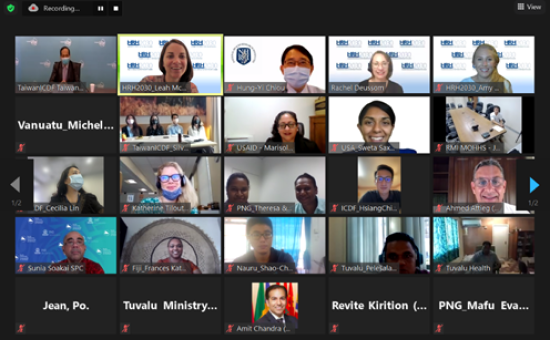
03 Aug Boosting the Capacity of Pacific Island Health Workers in Health Workforce Management and Data Systems
As the COVID-19 crisis continues to put a strain on countries’ health systems, obtaining accurate information about the health workforce is necessary for an effective, data-driven pandemic response as well as maintaining quality, essential services. In many Pacific Island countries, incomplete data collection and the low capacity of human resource managers can hinder the health systems’ response to crises, like COVID-19, and delivering routine health care provision. To address these challenges, the United States Agency for International Development (USAID) and the Taiwan International Cooperation and Development Fund (TaiwanICDF) recently held a two-part training to strengthen the capacity of Pacific Island countries to improve health workforce management and performance to deliver quality health services to their citizens.
The online training, Health Workforce Management and Data Systems: A Focus on Pacific Island Countries and Health System Resilience, attracted more than 50 health leaders, managers, development partners, and practitioners from 10 countries. The first session, held July 13, opened with remarks by USAID Acting Deputy Mission Director to the Philippines, Pacific, and Mongolia, Marisol Pérez, and TaiwanICDF Deputy Secretary General Dr. Pai-Po Lee, who affirmed their commitment and cooperation to ensure stronger health outcomes in the region and noted the even greater need for continued collaboration at the present time.
“The COVID-19 pandemic has weakened health systems globally, underscoring the need to strengthen health sector resilience. As the backbone of any health system, the health workforce plays a critical role in ensuring quality service delivery that is responsive to a country’s needs,” said Acting Deputy Mission Director Pérez.
The second session gave participants the opportunity to turn their new knowledge into action. Using a case study, participants were led through a realistic scenario built around COVID-19, vaccination efforts, and delivering essential care services. Attendees worked through a data analysis process to formulate an evidence-based response to the challenges. The session also included an overview of tools and approaches being used throughout the global health community to strengthen health workforce information and data systems, including cases from HRH2030’s work in Indonesia, the Philippines, Senegal, and Timor-Leste. The online format facilitated attendees’ exchange of resources, successes, and challenges related to improving their health workforce data and systems, to be better prepared to take action in their own countries.
Since the last session, HRH2030 has been engaging with the participants to better understand their health workforce challenges and data needs. Participants look forward to learning more about how to develop multisectoral coordination mechanisms and human resource information systems in their countries to inform decisions and take action.
As the Pacific Islands are vulnerable to climate shocks, natural disasters, pandemics, and other crises that can weaken the health system, USAID and TaiwanICDF aim to build on the outcomes from the training and partner with the Pacific Islands to strengthen the resilience of their health systems to deliver quality, essential services and respond to existing and future shocks.
Presentations and recorded sessions can be found here.
Photo: Speakers, facilitators, and participants at the Health Workforce Management and Data Systems: A Focus on Pacific Island Countries and Health System Resilience training hosted by USAID and TaiwanICDF with support from the HRH2030 Program.





